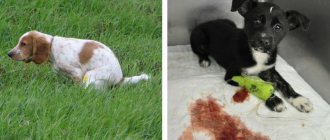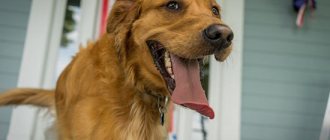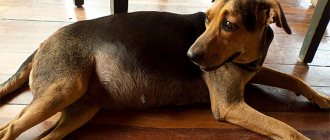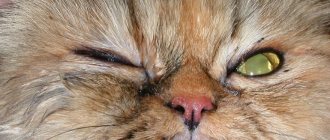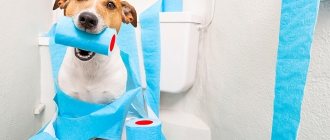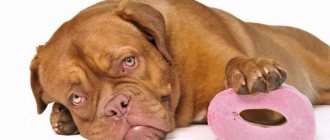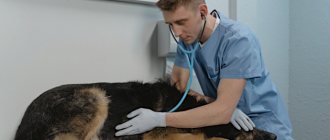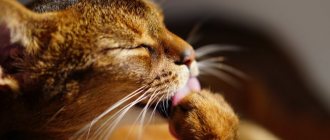One of the signs of a dog’s health is regular stool with well-formed, moderately soft and moist feces. The normal frequency of bowel movements is 2-4 times a day. If the animal defecates more often, the stool is watery, green, or contains mucus or blood, it has diarrhea. This is a fairly common disease in dogs. Owners should know what to do if an upset stomach occurs, what medications to give, how to help the pet and prevent the condition from worsening. Not all official and traditional medicine used to treat people are suitable.
Causes
There are various possible causes of diarrhea in adult dogs and puppies. Some are quite harmless, and diarrhea, even without treatment, goes away on its own in 1-2 days, others require dietary adjustments and careful care, and others are treated with antibiotics, which are prescribed by a veterinarian after examination and diagnosis. And sometimes diarrhea is a symptom of dangerous diseases in which the dog requires emergency veterinary care.
The most common causes of stomach upset in dogs are:
- low quality feed;
- binge eating;
- eating inappropriate foods, foreign objects;
- change of feed;
- allergy to some ingredient in the food;
- taking medications;
- helminth infection;
- viral infections;
- stress;
- lack of minerals and vitamins;
- age-related problems with the functioning of the stomach;
- chemical poisoning;
- neoplasms;
- dysbiosis.
When to contact a veterinarian
In some cases, it is unacceptable to treat diarrhea in a dog on your own. In case of a complicated course of the disease, you should consult a veterinarian. For example, an immediate visit to the clinic is required if there are blood clots in the stool, as well as black excrement.
- An examination is necessary if diarrhea is accompanied by vomiting, high or low temperature, mucous discharge from the eyes and nose, pain, or hydrophobia.
- If the diarrhea is not complicated, but is prolonged (more than 3 days), the dog should also be shown to a veterinarian.
Diagnosis and treatment (if diarrhea continues)
When contacting the clinic, the veterinarian must interview the owner (regarding the period of illness, symptoms, medications that were given to the dog), conduct an external examination, measure the temperature, listen to the heart and lungs.
He may also prescribe a blood test (general, biochemical, PCR), urine (density and protein content), as well as a stool test (for the presence of parasites, occult blood). The data obtained will help to localize the cause of diarrhea and determine the severity of the animal’s condition.
In addition, an ultrasound examination or x-ray may be prescribed if there is a suspicion of the presence of foreign objects, tumors, or violation of the integrity of organ tissue.
What should you be wary of?
Diarrhea can be an independent disease that can be successfully treated at home, or a symptom of more dangerous diseases. This is indicated by a change in the color of the stool, the appearance of mucus and even a small amount of blood in it, severe vomiting, and a sharp increase or decrease in body temperature. A dangerous symptom that requires an urgent trip to the veterinarian is the presence of mucous discharge from the nose and eyes.
If your pet suffers from diarrhea, you need to rule out viral infections (some of them can lead to the death of the animal, others pose a danger to humans), chemical poisoning (did the pet pick up food from the ground while walking or was it fed by ill-wishers) and internal bleeding . They can be caused by ingestion of sharp objects and certain diseases.
Prevention of diarrhea
The main preventive measure should include proper balanced feeding. Feeding puppies of different ages requires different types of food: mother's milk or mixtures - bitch milk replacers, starter mousses, puppy food. For proper feeding with a natural diet, consultation with a nutritionist is required. Preventive vaccination is carried out at the age of 8 weeks, then at 12 weeks. Up to 6 months of age, it is recommended to treat puppies for helminths monthly, then at least once every 3 months. It is necessary to prohibit the puppy from chewing its toys, picking up everything from the floor and from the ground on the street.
Uncomplicated diarrhea
The first thing you need to do when you discover that your pet has diarrhea is to make sure that it is uncomplicated and can be treated at home. The following symptoms are typical for uncomplicated diarrhea:
- stool more than 4-5 times a day;
- thin or watery stool consistency;
- gurgling in the stomach;
- the dog whines when he defecates;
- apathetic or agitated behavior;
- refusal of food;
- thirst.
In this case, the dog’s diet is adjusted, tablets for diarrhea are given and the opportunity to drink clean water without restrictions. A diet for indigestion is necessary for 3-4 days after the diarrhea has stopped.
To normalize digestion, dogs are prescribed homeopathic medicines, which are presented in our online store:
note
Quick view
LIARSIN homeopathic medicine for the correction of metabolic processes, prevention and treatment of diseases of the gastrointestinal tract, solution for injection (10 ml)
10 ml
328 ₽
Show all offers
Quick view
PANCREALEX homeopathic medicine for the treatment of diseases of the gastrointestinal tract, solution for injection (10 ml)
10 ml
337 ₽
Show all offers
If after 3 days the stool has not returned to normal, or the pet continues to diarrhea, a veterinarian’s consultation is necessary. Treatment with strong antibiotics can only be prescribed by a doctor.
Treatment
Uncomplicated diarrhea often resolves on its own and does not require treatment. If diarrhea has been going on for some time or is accompanied by other symptoms (blood in the stool, vomiting, lethargy, refusal to eat), treatment will be required. Even before diagnosis, small puppies are given maintenance volumes of crystalloid solutions subcutaneously or intravenously. Symptomatically, you can start using enterosorbents; they will bind all the toxins in the intestines. If intestinal parasitosis is confirmed, antiparasitic treatments are prescribed. It is believed that deworming medications in the form of drops on the withers do not work well in dogs, so it is recommended to carry out treatments in the form of tablets.
If a foreign object is detected in the intestine, in most cases surgical intervention will be required. Infections are treated comprehensively, using antimicrobial agents, painkillers, and gastroprotectors. Antimicrobial agents used include penicillins, macrolides, and metronidazole. Painkillers are usually used in hospital treatment as infusions at a constant rate, so that the analgesic effect can be provided exactly for the required time. Gastroprotectors protect the gastric mucosa and normalize the pH of gastric juice. Your doctor will tell you what to feed your puppy if he has diarrhea. Often, for diseases of the stomach and intestines, a therapeutic diet is prescribed. Specialized foods are easily digestible and also help restore the intestinal mucosa. If diarrhea was caused by dietary errors, a therapeutic diet is prescribed to normalize stool, which is usually sufficient in this situation.
What to feed a dog with diarrhea?
If your pet is diarrhea, it should not be fed for 24 hours. This will help stop the disorder that occurs, regardless of the cause. Even if a dog is vomiting water, this is not a reason to give it dry food or other usual food, much less treats, when it refuses to eat.
Once the cause of loose stool has been determined and it has become soft and not runny, you can give your pet light food. This can be rice in water or light beef or chicken broth. To restore the microflora of the gastrointestinal tract, high-quality, but not fatty, fermented milk products are useful. Then you can add hard-boiled eggs and lean boiled meat to your diet.
For recurring disorders and chronic diseases, add special feed additives to your pet's diet. You can purchase the drugs here:
note
Quick view
BIOCORRECTOR RD food additive for dogs for the prevention of gastrointestinal diseases, increasing immunity and allergies (90 tablets)
90 tablets
145 ₽
Show all offers
Quick view
PRO-KOLIN feed additive for the correction of digestive system disorders (15 ml)
15 ml 30 ml 60 ml
15 ml
to order
Show all offers
If soft stools appear when changing the diet, owners should know how to stop diarrhea from dry food. If it has just appeared in your diet, return to your normal diet for a while. Make sure that the food is not expired or spoiled and does not contain harmful or dangerous substances.
First aid for a puppy with diarrhea
Puppies should not be deprived of food for more than 24 hours, and representatives of small breeds - more than 12.
In the early stages of diarrhea (first day) and the absence of alarming symptoms, you can provide first aid at home:
Please note that in all other situations, including if the condition worsens, you should immediately contact a veterinary clinic, and ideally, call a doctor at home.
What to do if your puppy has diarrhea?
Due to age, puppies experience diarrhea more often than adult dogs. Many owners, when faced with loose stool in their baby for the first time, get scared and don’t know what to do. It is necessary to evaluate his condition, the presence of dangerous symptoms, such as bloody, black, green or yellow loose stools, and how frequent they are.
If diarrhea is not complicated by a change in the color of the stool, there is no frequent vomiting, blood and mucus, do not let the baby eat for several hours, offer water or rice water, you can give an activated charcoal tablet or anti-diarrhea powder as recommended by a doctor.
Couldn't you stop the diarrhea in 1-2 days? Don’t know what remedy to give for green diarrhea? Visit a veterinarian - only he can rule out parvovirus enteritis and other dangerous causes of diarrhea, prescribe medications and diet. If there are several puppies in the house, ensure that the animal that has frequent soft or loose stools is isolated until complete recovery.
Possible causes by age
At each specific age, there are some of the most common reasons why a puppy diarrhea. This does not mean that at one age only one reason is possible, and at another - only others. But diagnosis always starts with the most probable, so let’s look at this in more detail.
Diarrhea in a puppy 0-1 month old
Diarrhea in a newborn puppy can be dangerous. It is at this age that he is most vulnerable. Puppies cannot yet move independently, cannot see or hear, but they already have a well-developed sucking reflex. After birth, their first feeding begins with maternal colostrum. Colostrum contains the maximum amount of antibodies that can protect the puppy from viral infections. If you don't let your puppy nurse for the first few hours after birth, he will develop far fewer antibodies and be extremely susceptible to infection. But, in addition to antibodies, substances that the body does not need can be transmitted to the puppy through mother’s milk. For example, if a bitch receives some kind of medication, this may cause poisoning and diarrhea in her cub. In such a situation, it is necessary to transfer the puppy to artificial feeding. There may be another problem here - feeding with unsuitable milk. For artificial feeding of puppies, there are special ready-made mixtures that must be diluted with water. Only ready-made mixtures contain all the nutrients, vitamins and minerals necessary for proper growth and development. Often, small puppies are fed cow's or goat's milk, adding yolk and vitamins. Such a diet is very likely to lead to poor digestion, diarrhea, vomiting, and slow growth. The milk of different animal species differs significantly in its composition, and most importantly, in its content of fat, protein and sugar. Feeding the wrong type of milk is possible only as a last resort, when there is no way to purchase formula for dogs. In rare cases, puppies have individual allergic reactions to a formula from a certain manufacturer, which is manifested by loose stools. But when switching to a mixture from another company, everything usually resolves itself.
After 1 month, the puppy begins a new stage of growth, and you can begin to introduce complementary foods, following some rules. This should be done smoothly, in small portions, without immediately excluding breast milk. It’s better to start with special starter mousses, which many food manufacturers have. If you introduce complementary foods too abruptly (exclude milk completely, give a large portion at once), this can cause diarrhea. Food that is incorrectly selected according to age can also lead to diarrhea. Food for adult animals is not suitable as a first complementary food, because it has a completely different consistency and contains a different set of nutrients.
Before mating, the bitch must be treated for parasites. If this is not done, there is a high probability of infection of the puppies. The presence of helminths in the intestines will manifest itself in the form of diarrhea or vomiting. Many drugs, according to the instructions, are suitable for treating puppies from 3 weeks of age. If treatment is required earlier, this must be agreed with a neonatologist. He will help you choose the drug and dosage. It is not recommended to give medications independently and not according to instructions.
Diarrhea in a puppy 2-3-4 months old
From 2 months, puppies can be partially or completely fed on their own. When feeding a puppy with industrial ready-made food, you need to choose diets for dogs older than 2 months, but in no case should you give food for adult animals. If you plan to continue feeding with a home diet, then such nutrition should be discussed with a nutritionist. Unbalanced feeding very often leads to problems with the gastrointestinal tract and, as a result, diarrhea.
Starting at about 8 weeks of age, puppies run out of colostral immunity and are at risk of contracting various infections. Parvovirus enteritis is one of the most common infectious diseases of the stomach and intestines of puppies of this age. This is a very dangerous disease with high mortality, manifested primarily by diarrhea, often simultaneously with vomiting. In the absence of an ambulance, the puppy can die in a matter of hours. Canine distemper can also cause diarrhea in puppies. This is an even more dangerous condition, since, in addition to the intestines, it also affects the respiratory organs, skin, and nervous system. In recent years, plague has been recorded very rarely, which is due to conscientious vaccination. Before full vaccination and quarantine, under no circumstances should the puppy be allowed to come into contact with the street or unfamiliar dogs. You should wash your hands thoroughly before handling or feeding puppies. If the puppy has completed the full course of vaccination at 2 and 3 months, then he has very little chance of becoming infected. The vaccine does not provide a 100% guarantee of avoiding infection, but the disease in such dogs occurs in a much milder form. If your puppy over 2 months of age suddenly develops diarrhea and you don't know what to do about his loose stool, contact your veterinarian.
Diarrhea in a puppy 5 months and older
The causes of diarrhea in puppies older than 5 months are the same as those already mentioned. Often this is incorrect feeding with unbalanced food, various “goodies” from the table in the form of sausages, dried bread and other things. If the puppy has not been vaccinated, the risk of infection still remains. At this age, the puppy is already very active and should walk outside a lot. And this carries with it the risk of the baby eating inedible objects. Eaten sticks, bones, toys, bags can cause intestinal damage and partial obstruction, which will be accompanied by diarrhea. Also, when picking up on the street, there is a high risk of helminths entering the body. It is recommended to treat puppies up to 6 months monthly, then once every 3 months.
Diarrhea and vomiting: possible causes
If your dog has diarrhea and also vomits, especially repeatedly, and has a fever, you should not put off visiting the veterinarian.
Causes of vomiting and diarrhea:
- overeating - one-time or short-term vomiting is observed;
- food poisoning - may vomit several times;
- entry of a foreign body - a characteristic sign is profuse foamy vomiting, sometimes with blood;
- poisoning with chemicals, including inhalation, for example, if something was painted in the apartment or near the enclosure;
- switching to new food;
- helminthiasis - vomits immediately after feeding;
- parvovirus enteritis - the disease is observed mainly in animals aged 2 to 6 months, the puppy vomits and does not eat;
- rotavirus infections, adenovirus - are observed at any age, the mucous membrane of the eyes becomes inflamed, the liver enlarges.
Possible manifestations of diarrhea
Loose stools may be uncomplicated. It may also be accompanied by vomiting or blood and mucus.
Uncomplicated diarrhea
This can be called short-term diarrhea, which resolved on its own. This is possible, for example, when eating something that is not suitable for the usual diet. For example, dogs do not refuse to eat sausage, cheese, and sweets. But any violation of the diet can lead to a deterioration in the quality of stool. If diarrhea is not accompanied by vomiting, refusal to eat and goes away on its own within a day, then this condition is not considered critical and is required to visit a doctor.
With mucus
Often, along with the puppy’s loose stool, you can notice the presence of mucous films in it. Sometimes diarrhea can be completely surrounded by mucus. Mucus is secreted by goblet cells, which are found primarily in the large intestine. Its presence indicates that the process occurs in the large intestine or simultaneously in it and other areas. Most often, mucus in a puppy's stool will be a sign of the presence of parasites. Puppies are prone to infection with parasites because they are very curious and try everything. Intestinal parasites include helminths and protozoa. Most often you can find a round helminth, Toxocara, or a flat helminth, dipylidia. In this case, infection with dipylidia most often occurs through fleas. They are carriers of the eggs of this helminth, so you should not neglect flea treatments either. Of the protozoan parasites, the most common are Giardia and Coccidia. Also, mucus in loose stool in puppies with diarrhea can be a sign of improper feeding, various viral and bacterial infections.
Diarrhea accompanied by vomiting
If diarrhea is accompanied by vomiting, this is a reason to immediately contact the clinic. Since dehydration occurs very quickly, even before a final diagnosis is made, the puppy already requires first aid. Vomiting and diarrhea are often a sign of a viral illness. Parvovirus enteritis is an extremely dangerous disease that requires round-the-clock inpatient monitoring. Under no circumstances should you treat this infection yourself. The virus infects intestinal cells, leading to deterioration of their performance and inflammation. In the smallest puppies, the virus can even affect the heart muscle. Often the main cause of death for a puppy is dehydration, so good hydration is extremely important. There are no antiviral drugs that can defeat this virus. Another viral infection of puppies is canine distemper. In recent years, this disease has been reported quite rarely, but the mortality rate when infected is still extremely high. The virus can infect intestinal cells, causing diarrhea and vomiting. It also penetrates into other organs - the skin, respiratory and nervous systems.
Also, diarrhea may be accompanied by vomiting due to food poisoning (poisoning), eating inedible objects, or the presence of a large number of parasites in the intestines. Systemic diseases such as pancreatitis and liver disease are quite rare in puppies. Any case of diarrhea with vomiting should be discussed with a doctor. This condition requires research and urgent treatment.
With blood
In some cases, diarrhea may be accompanied by blood in the stool. Most often, small streaks or blood clots appear after diarrhea of quite a long duration. This is due to rupture of capillaries due to intestinal strain and constant tenesmus. If the blood in the diarrhea is profuse or flows from the butt without stopping, this may indicate serious intestinal bleeding or a violation of the blood clotting function. Bleeding is possible, for example, when eating sharp bones, sticks, or glass. Violation of blood clotting function often occurs due to poisoning with rodenticides - means for fighting rats. They are usually placed in something tasty and attractive to rats, but a curious pup may want a treat too. Anaplasmosis is an infectious disease transmitted by ticks. Anaplasmas invade platelets and destroy them, causing the blood to fail to clot adequately and causing intestinal bleeding. There is also a genetic abnormality called Von Willebrand disease. Dog breeds such as Doberman, Welsh Corgi, Bernese Mountain Dog, Coton de Tulear, Papillon, and Poodle are more susceptible to this disease. The disease is manifested by a decrease in blood coagulation function due to a genetic defect and, as a result, bleeding. All of these cases require emergency veterinary care and should under no circumstances be observed at home.
After vaccination
In rare cases, diarrhea may occur as a side effect of the vaccine due to decreased immunity. If the diarrhea is one-time and goes away on its own, then there is no need to sound the alarm. But if the puppy develops diarrhea, accompanied by vomiting, in the first hours after vaccination, this is a reason to immediately return to the clinic. These symptoms may indicate an anaphylactic reaction and require immediate attention.
Melena
Melena is black, unformed stool that resembles tar, often with a foul odor. Melena is a symptom of bleeding in the stomach and upper intestines. At the exit, the blood turns black, as it has time to be digested by gastric juices and enzymes. Melena can be observed with injuries to the stomach and intestines due to eating sharp inedible objects. Melena is also the first sign of peptic ulcer disease. Ulcers in a puppy are most often associated with eating some chemicals (washing powder, vinegar).
Yellow diarrhea
For small milk-fed puppies, soft, light brown stools are normal. But if the stool is bright yellow, or the pet has been eating adult food for a long time, and its stool previously looked normal, then this is worth paying attention to. The most favorable reason for yellow, loose stools is eating some inappropriate foods (for example, a puppy drank a lot of cow's milk). But more threatening diagnoses are also possible, such as diseases of the liver, gallbladder or pancreas. If such a stool is detected, you should immediately undergo examination.
Hurry up, choose a box and find out what gift awaits you
Discount on pet insurance
Promo code copied to clipboard
How to treat?
If the animal has vomited no more than 3 times, the stool is brown, without blood and mucus, treatment is carried out in the same way as for uncomplicated diarrhea. It is advisable not to let your pet eat during the day, but be sure to give him something to drink. It is better to give drinks often, but little by little. Medicines for diarrhea and vomiting that can be given immediately, without consulting a veterinarian, are sorbents: activated carbon tablets or smecta powder. If a dog is bothered by stomach pain, no-shpa or papaverine is used to relieve spasms. When the condition stabilizes, it is necessary to follow a gentle diet for 3-5 days.
If the symptoms are severe and last more than a day, a water-salt solution is administered to prevent dehydration of the body. In other cases, treatment is prescribed by a veterinarian. It may be necessary to lavage the stomach in case of poisoning, remove a foreign body, or take antibiotics or anthelmintics.
Let's sum it up!
The first steps to take if your dog has diarrhea are:
- Try to find out the cause, identify external factors that could influence its occurrence
- Short fasting diet (as described above in paragraph 1)
- Provide access to water, or better yet, give a saline solution like Regidron to drink
- Nutrition adjustments, if necessary (remove new foods, feed familiar foods)
- In case of uncomplicated diarrhea, sorbents can be given
If diarrhea continues for more than a day or other symptoms appear, you should immediately contact a veterinary clinic.
What not to do:
- You cannot use antibiotics and antimicrobials yourself. Only a veterinary doctor should select an antibiotic, its dosage, and frequency of use. There are strict indications and contraindications for the use and choice of antibiotics. What works for people often doesn't work for dogs. In addition, improper use of antibiotics makes bacteria resistant to them. And this is very dangerous.
- You cannot use a drug such as Loperamide or drugs with a similar effect on your own. They “stop” the intestines and in most diseases can worsen the course of the disease and cause complications
- Do not give your dog folk remedies from the vodka with egg series and other miraculous potions. In addition to wasting time, you can also cause poisoning and burns to the digestive tract.
CALL, take care of your pet's health!
VET CLINIC DOG AND CAT
Kharkov (M. 23 August) st.
Novoprudnaya, 9B OPENING MODE: ROUND THE CLOCK
Call center:
☏ (057) 751-32-42 ☏ (063) 722-88-48
☏ (066) 875-31-13 ☏ (096) 880-89-11 viber
Causes of loose, frequent stools with mucus and blood
If your pet is diarrhea and there is blood or mucus in the stool, you should immediately consult a veterinarian, even if the diarrhea is not too severe. Bloody diarrhea with mucus indicates serious problems in the dog’s body:
- atypical form of rabies;
- dysbacteriosis - the color of the stool often changes, blood and a large amount of mucus may be present;
- ingestion of a sharp object and damage to the intestinal walls - bloody stool;
- poisoning with chemicals, medications;
- stomach ulcer;
- pancreatitis;
- neoplasms, tumors;
- intestinal infections;
- parvovirus enteritis - frequent stools with blood are especially dangerous for puppies; a visit to the veterinarian should not be postponed;
- helminth damage to internal organs - bloody diarrhea appears when tissues and blood vessels are damaged.
Diagnostics
Diagnosis of diarrhea is based, first of all, on collecting a detailed medical history of the pet. It is necessary to tell the doctor in great detail about what the puppy eats now and what he ate before. What kind of treats does he receive, when and with what preparation was he treated against parasites, was he vaccinated, can he pick up something from the floor or on the street, does he chew on his toys. You shouldn’t hide the most inconvenient moments from the doctor, for example, how you didn’t keep track and the puppy ate his diaper. These data will greatly facilitate making the correct diagnosis and, accordingly, prescribing treatment.
Additional diagnostic methods may include blood tests. A clinical blood test will show the presence of dehydration; if red blood counts are elevated, a decrease will indicate anemia. An increased level of leukocytes will reveal the inflammatory process, a shift in the leukocyte formula to the left will indicate the severity of this inflammation, and increased lymphocytes will rather indicate the bacterial nature of the inflammation. A decrease in the level of leukocytes often indicates the viral nature of the disease, which is very typical for parvovirus enteritis. The level of albumin and potassium in the biochemical analysis will indicate whether serious losses have occurred due to diarrhea.
PCR studies are used to confirm the infectious nature of the disease. If there remains a suspicion that the puppy has eaten a foreign object, tests such as abdominal ultrasound and x-rays are performed. In doubtful cases, after feeding the puppy a contrast agent, a series of x-rays may be taken to determine the location of the foreign object.
If the parasitic nature of diarrhea is suspected, different diagnostic tactics may be proposed. It can be difficult to confirm the presence of parasites in feces in a laboratory. Helminth eggs are not released with every bowel movement, and you may not guess on what day the analysis needs to be collected. In this case, it is recommended to donate stool several days in a row. To detect protozoa, feces must be delivered to the laboratory as fresh and warm as possible; within half an hour, all parasites may die, and nothing will be found in the laboratory. Due to these difficulties, your doctor may suggest a trial treatment plan for parasites. The success of therapy will indicate a correct diagnosis.
Next, we will look at what is done when a puppy has diarrhea, and what treatment is necessary in this case.
Unusual stool color
A change in the color of the stool is also a cause for great concern. Symptoms may indicate serious illnesses:
- green - feces become green due to dysbacteriosis, feeding with low-quality food, and bacterial and viral infections;
- black - indicates bleeding in the stomach, but stool turns black even if you give your pet activated charcoal;
- red - indicates bloody discharge in the gastrointestinal tract, damage to the walls or blood vessels;
- yellow - occurs with indigestion, liver failure, worms, if the stool is liquid, yellow and has an unpleasant odor, and the body temperature is low, it is necessary to exclude parvovirus enteritis;
- white is a dangerous symptom indicating a possible blockage of the biliary tract, which requires emergency treatment.
Diagnosis and treatment
When contacting a veterinary hospital, a thorough clinical examination of the animal and anamnesis should be taken. According to the owner's story, the doctor determines what can cause diarrhea in the patient.
Next, a series of laboratory tests are prescribed to establish the reliable cause of the development of diarrhea. As a rule, the treatment regimen for diarrhea in a dog includes the following points:
- enterosorbents - medicines that allow you to bind and remove toxic substances from the body as quickly as possible (Smecta, Enterosgel, white activated carbon);
- antimicrobial agents - antibiotics are prescribed for diarrhea caused by the development of pathogenic bacterial microflora (Enterofuril, Furazolidone);
- hemostatic drugs - necessary to stop the free flow of blood from the vessels during diarrhea with blood (Ditsinon, Vikasol);
- antidiarrheal medications - indicated for severe profuse diarrhea (watery);
- medications to normalize the balance of intestinal microflora - Lactobacterin, Linex.
Diarrhea in case of poisoning should be treated with preliminary measures. Initially, gastric lavage is prescribed. During inspection and rinsing, foreign objects stuck in the digestive tract are also removed.
If a specialist suspects helminthiasis in a puppy, tests necessary to determine the species of the parasite are prescribed. The animal is prescribed a course of treatment taking into account its individual characteristics. After treatment, a repeat test is prescribed.
The main task of a veterinarian in cases of diagnosed viral infections is to eliminate diarrhea and stop attacks of vomiting. Vitamin and mineral complexes are introduced into the body. Anti-inflammatory drugs and antiviral medications are used. The puppy is injected intramuscularly with Cerucal, Reglan or barium sulfate, which eliminates the eruption of gastric contents.
If a puppy has bloody diarrhea, treatment consists of stopping the bleeding in a timely manner. Next, a course of therapy is prescribed, including general strengthening drugs and potent medications. Detection of ulcerative lesions and neoplasms in the digestive tract implies surgical intervention.
Puppies of different ages often suffer from diarrhea that occurs during vaccination. There may be several reasons for the development of diarrhea:
- colds that occur before or immediately after vaccination;
- intestinal disorders;
- lack of necessary antiparasitic treatment before immunization.
If a puppy develops diarrhea after vaccination, it is necessary to carefully monitor the general condition and the appearance of accompanying symptoms. If the animal refuses to drink and water, has a fever, is lethargic and apathetic, it is necessary to consult a veterinarian.
If other signs of ill health, besides diarrhea, are absent after vaccination, medications with antidiarrheal properties are prescribed.
How to treat?
At home, you can only provide first aid; your pet should be treated after examination by a veterinarian. For bacterial infections, antibiotics are needed, the use of which in case of dysbacteriosis or liver problems can worsen the animal’s condition. The doctor will select effective adsorbents and antispasmodic drugs, and calculate the dosage depending on the weight, condition and age of the dog.
It is important to strictly follow the veterinarian's recommendations regarding feeding and drinking regimen. Most often, it is recommended not to feed the animal for a day - there is no need to worry, a short-term hunger strike will not cause harm. It is also necessary to ensure that your pet drinks enough water. After the condition improves, it is necessary to follow a diet, and only then switch to a nutritious diet. If your pet has loose stools, do not give any treats, new types of dry food or tablets from your first aid kit, except for activated charcoal.
What is diarrhea?
Diarrhea is the frequent passing of liquid stool. In most cases in dogs, it is provoked by inflammation in the small intestine, which can be caused by many pathogens: bacteria, viruses, parasitic worms (helminths), yeast, rickettsia and others.
A veterinarian in his practice is constantly faced with the problem of diarrhea in dogs. The pathology can occur from time to time and end quickly, but there are frequent cases when acute diarrhea can last up to 4 weeks. Diarrhea can occur in a dog once without unpleasant consequences - then there is no reason to worry. But it may take several days. A week's worth of diarrhea in a dog and its accompanying symptoms, such as frequent loose bowel movements, the appearance of mucus, blood in the stool, vomiting, general lethargy and others, is a reason to contact a veterinarian for consultation.
The choice and method of treatment for diarrhea will depend, first of all, on the color of the diarrhea. Treatment usually takes place at home and consists primarily of changing diet and water consumption. An animal with watery stool loses a lot of nutrients, and drinking plenty of fluids helps prevent dehydration and restore electrolyte balance. Adsorbents are used to combat intoxication. In severe cases, a course of antibacterial drugs is recommended.
Next, we will analyze all the possible causes of diarrhea in a dog, depending on the color of the stool and other reactions of the animal, and tell you what needs to be done to treat the dog.
How to care for a dog if it has loose stools
Indigestion should be stopped as quickly as possible. If it is not complicated (the feces are brown, not black, yellow, green or white, there is no mucus and blood, repeated vomiting), then diarrhea in a dog should be treated with a set of measures:
- Do not feed for 24 hours, then, when the stool is less liquid, follow a diet for several days - offer rice boiled in water, high-quality fermented milk products to restore intestinal microflora, or dry food recommended by a veterinarian. You should feed not 2 times a day, but 5-6, but in small portions.
- Drink clean water or decoctions of medicinal herbs, rice water. It is better to drink little by little, but often.
- Give absorbents - activated carbon, other drugs should be given only after consultation with a veterinarian.
Provide your pet with peace and a comfortable temperature, do not tire him out with long walks, and do not invite guests into the house.
If your dog has diarrhea without other symptoms
If the dog simply has diarrhea without complications, then the reasons most likely lie on the surface. Usually the dog defecates 2 to 4 times a day, its feces are formed, moderately soft and moist. When an animal visits the toilet more often and the stool loses its shape, becoming thin and watery, a problem appears - diarrhea.
Possible reasons
- Stale or low-quality food;
- Unsuitable food for dogs;
- Switching from one type of food to another (for example, from homemade food to special dry food);
- A sudden change in brand of dog food;
- Allergy to any food ingredient;
- Accidentally eaten foreign object;
- Disturbances in the gastrointestinal tract due to medications taken;
- Infection with helminths.
Treatment
Before you begin treating an animal, you need to analyze the food it received the day before. If a suspicious eaten product is detected: raw meat, sour milk, new food, etc. low-quality or unsuitable products, simply exclude them from the dog’s diet. If you overeat something, try to reduce the portion or increase the interval between meals.
If, apart from diarrhea, the dog is not bothered by anything, but the stool remains liquid after the measures taken, it is necessary to do home treatment.
What to do?
- Do not let the dog eat for 24 hours; Give her clean water as often as possible to replenish the lack of fluid and electrolytes in the body;
- If necessary, administer intravenous infusion solutions;
- Give the animal adsorbents that collect toxic poisons, which will then be released through the intestines;
- For prolonged diarrhea, use antibiotics;
- If worm eggs are detected in stool tests, take anthelmintic drugs.
What to give your dog for diarrhea from your home medicine cabinet?
If your pet has an upset stomach, remedies from your home medicine cabinet will help stop it. But you can only get by with home remedies for uncomplicated diarrhea. If you notice green, white, yellow or black liquid stool, the first step is to call your veterinarian or go to the clinic to determine the cause.
The following medications are allowed to be given to animals for diarrhea:
- Activated carbon;
- smecta;
- enterofuril;
- furazolin;
- loperamide;
- levomycetin.
From this list of medications, only activated charcoal can be given as first aid without consulting a doctor. It can be replaced with a modern drug with a milder effect - enterosgel. It is necessary to correctly calculate the dosage taking into account the weight of the dog. Should I give other medications and in what dosage, especially if the pet is vomiting.
First aid at home
If we are talking about diarrhea due to poor nutrition or mild poisoning, you can try to help the puppy yourself.
- Organize a small hunger strike for the puppy. Let the contents of the stomach and intestines be released entirely; the arrival of new food can increase the spread of infection in the gastrointestinal tract, and fasting, on the contrary, will relieve inflammation. The fasting period for large breeds is from 12 to 24 hours, for miniature breeds and newborn puppies - no more than 6-10 hours.
- Prevent dehydration. Pour warm, boiled water into a clean bowl for your puppy so he can drink at any time. If the puppy does not show interest in water for a long time, give it a drink using a syringe without a needle. Do not give the puppy too much water at once in this way; it is better to give little, but often. If the puppy becomes noticeably dehydrated, an IV can be placed.
- Clean up on time. To prevent the spread of infection, remove feces immediately and clean the tray and bedding thoroughly.
- Give your puppy absorbents. Vomiting and diarrhea remove harmful components from the body, but in order to speed up this process and alleviate the puppy’s condition, it is good to give adsorbents. Activated carbon, Enterosgel (softer and more effective than coal), Smecta (be careful, it cannot be given simultaneously with other drugs) are well suited for this purpose.
- You can try to make your puppy vomit. To do this, you will need a solution of potassium permanganate (bring the liquid to a slightly pinkish color), saline solution (1 tablespoon per full glass of water) or a mixture of water with 3% hydrogen peroxide (mix in equal proportions). Give one of these remedies to your puppy, preferably warm. This will speed up the healing process for minor poisonings.
Read Etiology of actinomycosis in dogs: signs, therapy and prevention
Be careful with the dosage of adsorbents, follow the instructions. Puppies at 1 month and at 2 months require different amounts of medication. At 3 months, when the permanent teeth begin to emerge, you can give your puppy something to chew on to relieve pain.
What to drink for a dog with soft stools?
One of the main dangers of diarrhea, especially for puppies and small dogs, is dehydration. To prevent complications of diarrhea and quickly stop diarrhea, your pet must be given water. It's better to do this little by little, but often. Many animals refuse to eat, but are very thirsty. On the first day of illness, pets can be given not only water, but also rice water, which will act as a mild medicine. You can also treat diarrhea with decoctions of medicinal herbs: chamomile, oak bark, marshmallow root. Regidron solution will also help maintain the water-salt balance, but it is not always possible to give the dog a drink, then you can inject a small amount of liquid into the mouth using a syringe.
Nutrition for indigestion in dogs
In the first day (for puppies no more than 12 hours ) after the onset of symptoms of diarrhea, it is recommended to provide complete rest to the dog’s gastrointestinal tract. Any food is excluded, water must be constantly available, since due to diarrhea the dog loses a large amount of fluid. If necessary, the veterinarian administers intravenous infusions of maintenance solutions.
On the second day , it is allowed to consume rice water; later, liquid porridge from the same cereal is added to the diet. If the animal gets better, then on the 3-4th day it is possible to include fermented milk products and low-fat dishes in the menu, for example, rice, boiled chicken, sea fish, eggs.
All food should be warm, finely chopped, and given in small fractional portions several times a day. It is prohibited to give your dog vegetable oils or milk during the recovery period, as they can cause weakness.
What should you not give to animals with loose stools?
If your dog has indigestion or another disease accompanied by diarrhea, it is necessary to completely exclude from the diet until complete recovery:
- raw meat;
- fresh milk - it is not advisable to give it to healthy dogs;
- fermented milk and other high-fat products;
- fresh vegetables and fruits;
- flour products, sweets;
- potatoes and cabbage (even boiled);
- new types of dry food or canned food.
For animals that eat dry food, during the recovery period you should buy products of the same brand, but from the diet line.
You can replace dry food with canned food or pates from the same manufacturer. It is strictly unacceptable to treat a dog with antibiotics or other potent tablets and powders without consulting a veterinarian. Folk remedies also require a critical attitude - not all of them can be used to treat a dog.
What medications are appropriate for a dog to relieve the symptoms of diarrhea?
It is safe to say that “human” medications for the treatment of dysentery are also suitable for diarrhea in dogs, but in each specific case it is better to consult a veterinarian. Suitable popular drugs:
- Activated carbon
. This time-tested and absolutely harmless remedy can be safely given to your pet to eliminate toxic manifestations. When dosing, you need to take into account the dog's weight. The analogue, enterosgel, acts more successfully and gently. - Smecta
. It also helps well with simple diarrhea and mild poisoning, alleviating the condition of a sick animal and helping to remove toxins from the body. The drug, diluted in warm water, is given to the dog from a syringe. It is better to consult a specialist first about the dosage. - Enterofuril
. This sweet suspension is enjoyed by dogs and is excellent in treating intestinal infections, as well as relieving diarrhea. Do not take it on your own without your veterinarian's approval. - Furazolidone
. If a dog's diarrhea is caused by intestinal disorders, then, along with other means, furazolidone can be given to the pet to restore the microflora. - Loperamide
. One of the most popular and accessible human remedies for diarrhea. If your dog has severe diarrhea, this remedy can be taken once in the form of 1 tablet. Although many veterinarians advise to completely avoid this remedy. - Levomycetin
. This synthetic antibiotic, active against various types of microbes, is popular in the treatment of infectious diarrhea in both humans and animals. When treating diarrhea in dogs caused by severe infections, the “animal version” is usually used - Levomycetin 250 tablets. The human drug can be given to the dog once, in case of emergency.
As you can see, almost all “human” drugs are suitable for treating dogs. But they should be used with caution, after consulting with a veterinarian. It is best to use veterinary drugs to stop diarrhea and restore microflora.
Among them, the often recommended one is Vetom 1.1 and any other veterinary drug prescribed by a specialist.
In addition to medications, folk recipes and remedies are often used in the home treatment of canine diarrhea. Popular among them are decoctions and infusions of St. John's wort, oak bark, and chamomile, which have astringent and soothing properties. If you have diarrhea, you should not give your dogs vegetable oils - they will act as laxatives. Although flaxseed oil is useful for inflammatory diseases of the stomach and intestines, it is better to exclude it from the diet during diarrhea.
